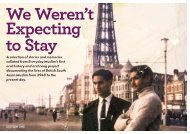Race, Faith and Community in Contemporary Britain Essays on Black, African, and African Caribbean Muslims in the UK PROUDLY MUSLIM & BLACK REPORT 2022
Black British Muslims play an important role in British society but are poorly represented in public discourse, policy, and indeed across a range of sectors. To overcome structural disadvantages and racism in society and in Muslim communities, we aim to create a platform for interventions in discourse and representation as well as in power relations. Our effort is collaborative and aimed at exploring the diversity, contributions, heritage, as well as the history of Black British Muslims. Our objective in this report is to create a platform to review and consider the current state of race and power relations, while creating networks and partnerships. In short, bringing Black British Muslim voices to the forefront is to work towards inclusion and belonging in British society and importantly, in British Muslim communities.
Black British Muslims play an important role in British society but are poorly represented in public discourse, policy, and indeed across a range of sectors. To overcome structural disadvantages and racism in society and in Muslim communities, we aim to create a platform for interventions in discourse and representation as well as in power relations. Our effort is collaborative and aimed at exploring the diversity, contributions, heritage, as well as the history of Black British Muslims. Our objective in this report is to create a platform to review and consider the current state of race and power relations, while creating networks and partnerships.
In short, bringing Black British Muslim voices to the forefront is to work towards inclusion and belonging in British society and importantly, in British Muslim communities.
Create successful ePaper yourself
Turn your PDF publications into a flip-book with our unique Google optimized e-Paper software.
My career has been shaped by my faith and a sense of responsibility to my community. I
played different roles working with women, students, and in different sectors from health to
the performing arts. But as a Muslim woman of Black Caribbean heritage, I was often seen
as an outsider in the Muslim community. Much of this had to do with race, reflecting both the
larger disjunctures in the British Muslim community and inequalities in society. I have found
ways to challenge these inequalities and to advocate for inclusion. In particular, the tools of the
performing arts have been useful to deliver simple messages through powerful ways to strive
for unity and equality in our communities and in society.
My career began as a fitness instructor, working with Muslim women who I found were suffering
from various ailments. Recognising the lack facilities in the 1990s for British Muslim women
in London, I wrote a hundred letters to masajid that had already offered men classes such
as boxing, wrestling, or football. I thought ‘You’ve got spaces and you’re doing stuff for the
men, why don’t you do something for the women?’ Only one mosque got back to me and
said, ‘thank you very much for your nice letter’ and that’s it. So I begun to hire out churches
and Blackout windows to make it safe for Muslim women who also would ask for nutritional
advice. Not only did we manage without any support, but I was also confronted by an imam at
a mosque: “Why are you trying to lure our women?”
Health, Community,
and Belonging
by Anisa Kissoon
Despite encountering hostility, new opportunities arose. My career took another turn as I was
offered teaching roles. As a PE teacher at several Muslim schools in London, sometimes I
would just be given a classroom. I had to use this little space to teach sports and fitness.
Meanwhile, I began to travel extensively; charity had always been one of my biggest passions.
I felt it important to take my children with me and we would fundraise for projects and travel
to deliver the funds to countries such as Kenya. At the same time, my interest in Prophetic
medicine and healing grew and when I travelled to Egypt I was taught how to teach hijama 38
therapy and bring awareness to this forgotten therapy to the UK. By 2006, I was certified and
set up my own company in London and finally was ready to write my first book on holistic
health.
My second foray in health did not go without significant obstacles, being a Black female
revert to Islam. Again I was treated differently. I spearheaded the campaign for hijama to be
accredited in the UK, and though I worked with the British Acupuncture Council to ensure
hijama was recognised on its own rather than being regarded as a form of traditional Chinese
medicine, it was with great reluctance I was recognised by a group of doctors at a conference
about hijama. This blow and many others was almost enough to make me want to give up.
Fast forward to the 2010s and my career took another turn - this time, towards the performing
arts when I used drama as a pedagogical tool with my children and started a theatre group,
U Can B The 1. I was inspired by a drama group in the Congo who used drama workshops to
raise awareness of women’s safety and we did small charity gigs. For me, it was important
to recreate stories, as we were storytellers and poets. Our drama group used performances
to teach audiences of women and youth about social issues like cyberbullying or gaming
addiction. The group would perform at schools and other community settings; drama is an
38
Cupping
176
177





